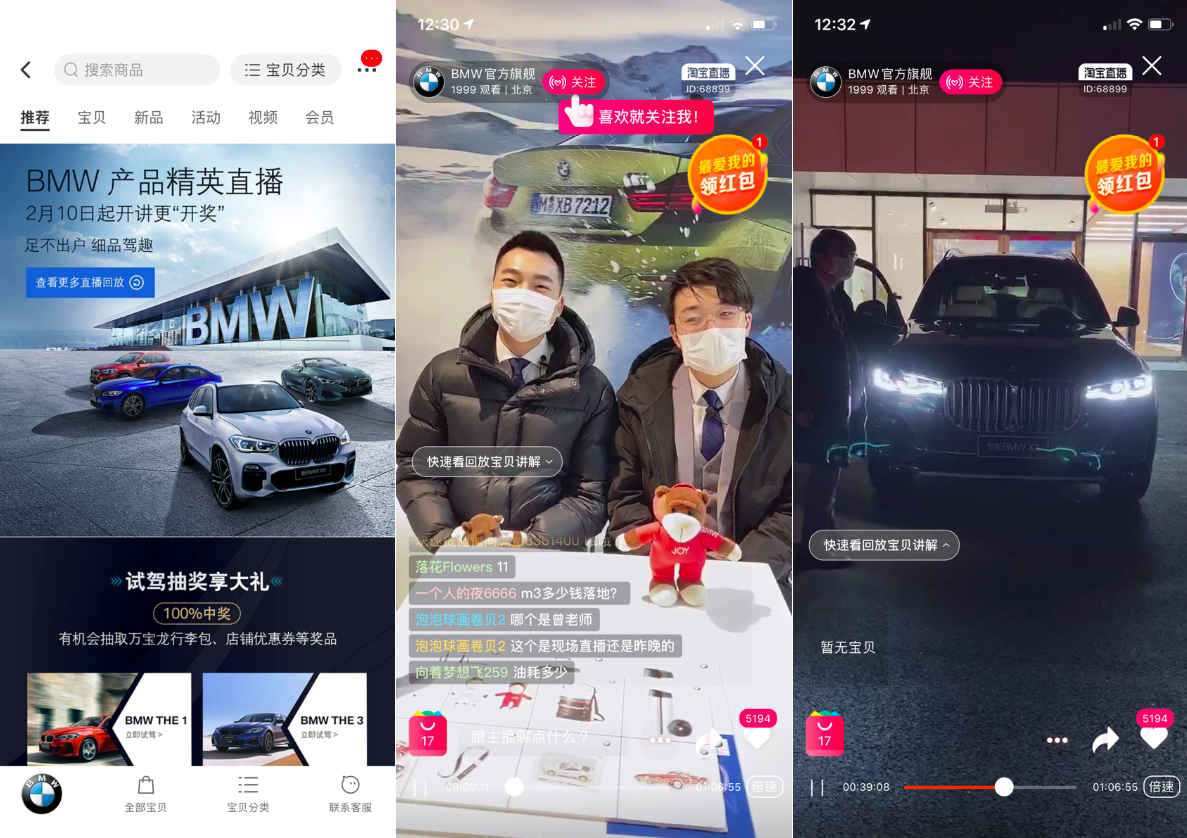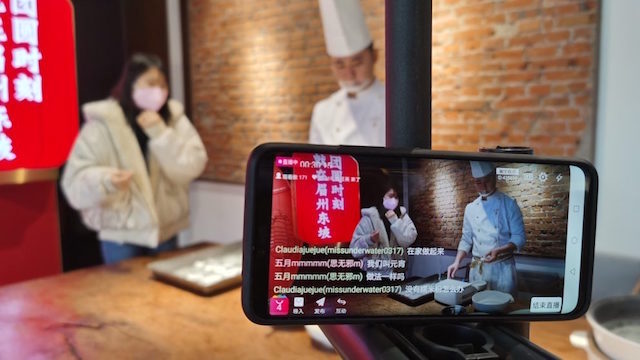Taobao Live, Alibaba Group’s livestreaming platform, saw a sharp rise in brand activity this past month as merchants slowly resumed their operations and looked for ways to reach consumers in the midst of the coronavirus outbreak.
In early February, livestream sessions on the platform had increased by 110 per cent compared to the same period last year, according to Taobao Live. Driving that growth was the surge of businesses using online tools to maintain sales and engagement with consumers while their physical stores remained shuttered and millions were confined to their homes to prevent further spread of the coronavirus, officially known as Covid-19.
Public facilities, retail stores, offices and schools throughout the country are now cautiously reopening after an extended closure. But virus fears still loom – despite a drop in new cases of infections – and more time is needed to bring economic activities and production levels back to normal.
Innovating out of crisis
For merchants across different industries, livestreaming has become an important tool not only to offset the decline in offline business, but also to encourage creativity in marketing and developing customer relationships. This month, Taobao Live users would have seen chefs broadcasting cooking tutorials in restaurant kitchens, real-estate agents giving tours of apartments, celebrities and singers performing in an online concert from their homes, rural farmers promoting their fruits and vegetables and even auto dealers showcasing the interior of luxury cars.

Auto brands such as BMW are leveraging livestreaming to introduce consumers to car models, interiors and experience of test drives.
“We want to make it easier for different clients across sectors to make use of livestreaming and help them more quickly resume operations,” said Yuan Yuan, head of content operations at Taobao Live.
Her task force worked closely with other Alibaba business units, such as DingTalk, Tmall, Taobao and Juhuasuan, to connect with more merchants – removing barriers for them to register accounts, as well as providing training and marketing resources.
“The project turned out to be more than a way to support brands. It also helped some discover their potential in livestreaming,” said Yuan. “It was truly impressive to see how nimble and decisive our brand partners were. Their management capabilities helped transform a crisis into an opportunity.”
Brands go live
Shanghai-based cosmetics brand Forest Cabin temporarily closed about half of its 337 stores across China due to the virus. Its stores that did remain open found few shoppers. In an interview on January 31, founder Sun Laichun said sales had dropped 90 per cent during the Spring Festival holiday, traditionally a peak season for shopping.
If circumstances continued, he estimated a loss of up to RMB30 million (US$4.26 million) a month and possible bankruptcy in under two months. But the brand embarked on a turnaround strategy with livestreaming at its centre, and in just 15 days, Forest Cabin’s sales surpassed the same day last year by 45 per cent.
The brand trained 1600 shop attendants on how to host a livestream on Taobao Live and was soon adding some 3000 new loyalty members a day, up from the typical average of 800 to 1000 people. Sun, himself, joined in and hosted a two-hour session on Valentine’s Day in front of more than 60,000 viewers. By the end of the session, he had sold nearly 400,000 bottles of camellia moisturising oil and generated close to RMB400,000 in sales.
While online only represented about 25 per cent of Forest Cabin’s sales before, it now accounts for 90 per cent. “The results were beyond my imagination,” Sun said.
For some brands, livestreaming is not just a standalone marketing tool but can be used strategically alongside other online resources to drive sales for new products. On February 13, Chinese technology brand Xiaomi tapped Taobao Live, among other livestream channels, to broadcast the launch of its new flagship smartphone, Mi 10, from its Beijing headquarters. The phone officially went on sale the next day during Xiaomi’s Tmall Super Brand Day, which rallies all the resources across the Alibaba ecosystem to create a smaller version of the company’s annual 11.11 mega-sale for a single brand, and became the top-selling smartphone on Tmall, leading to over RMB300 million in total sales for the brand.
Sportswear giant Adidas also hosted an exclusive online debut of its limited-edition Superstar sneaker during its Super Brand Day last week. Its “See Now, Buy Now” stream, which lets consumers make real-time purchases of featured items from their mobile phones, drew 2.23 million viewers and generated more than RMB200 million in sales in 10 hours. The format has become so popular among brands that product debuts on the platform are now scheduled up to the end of April, said Taobao Live.
Cooking up a storm
The spread of the virus has also taken a heavy toll on the restaurant business. Last year, earnings over the Spring Festival holiday represented about 15 per cent of the annual revenue of China’s food and beverage industry, which totalled RMB4.67 trillion, per a report released by the China Cuisine Association earlier this month. The survey found that about 73 per cent of companies chose to close all of their offline stores in response to the coronavirus. The CCA also estimated that consumers – many who called off family reunions to avoid face-to-face contact during the outbreak – cancelled about 94 per cent of food orders ahead of Chinese New Year. Beijing-based restaurant chain Meizhou Dongpo, for example, said it canceled 11,144 table reservations across its 100-plus stores during January 21-30 and lost about RMB17 million over the Spring Festival period.
With offline businesses at a standstill, Meizhou Dongpo began leveraging its brick-and-mortar staff to virtually connect with consumers and drive sales to its online store. Its chefs appeared in livestreams to show viewers how to make traditional delicacies like homemade glutinous rice balls ahead of the Lantern Festival. This allowed the brand to share its craft with fans and receive direct feedback on things such as popular dishes. The sessions also directed consumers to products like braised pork belly in the chain’s Tmall flagship store, creating another revenue stream for the restaurant.
Unlocking new opportunities
Businesses have also taken the opportunity to train employees and build partnerships based around livestreaming. China’s second-largest home-improvement and furniture retailer, Easyhome, said staff from 232 of its stores nationwide broadcast 4810 sessions last week to 3.58 million viewers. Meanwhile, in collaboration with brand partners such as Estee Lauder, Lancome, Kiehl’s, Vans and Baodao Optical, Intime department store launched an initiative encouraging staff to stream from their homes.
Idle factories and traditional markets, like the wholesale marketplaces in the Chinese city of Yiwu, are also using the tool to bring in business. Taobao said it plans to hold an online market on February 27 for all brick-and-mortar business owners, including the 3000-plus Yiwu-based merchants already registered on Taobao Live.
To help more small- to medium-sized enterprises learn how to effectively use livestreaming for business, Taobao University, Alibaba’s education platform for e-commerce operators, will also stream a free online course on February 25, covering topics from developing followers and campaign planning to live-hosting techniques. Brands including Volkswagen, Nike and Mars have also set up training sessions through Taobao University to help employees get the most out of the livestreaming platform.
Taobao Live said it is now collaborating with even more industries to bring their offline experiences and products online. These include tourism agencies, fashion shows and museums, such as the National Museum of China, Suzhou Museum and Dunhuang Museum.
“The future of shopping will be more dynamic, interactive and driven by real-time feedback. Livestreaming offers a peek into that future and new possibilities,” said Yuan.
- Christine Chou writes for Alizila, the independent (but Alibaba-funded) news source about Alibaba activities. This story was originally published on Alizila.com.






